Regulatory changes are on the agenda for the Queensland Government to reduce the environmental impact of visitors and their four-wheel drive vehicles in its national parks.
The Queensland government has commissioned Sustainable Visitor Capacity Management (SVCM) studies from consultants for three national parks and this week released documents detailing those findings and the state’s proposed actions.
You can view these reports here.
Consultants have been commissioned to study the resort areas of Bribie Island, Cooloola and K’gari (Fraser Island) in the state’s southeast, which have been identified as three of Queensland’s most popular destinations for day and overnight visitors.
-
An Audi S5 got stuck in the Bribie Island recreation area
The three areas attract more than 23,000 vehicles each year and record more than 592,000 camper nights (i.e. the number of campers multiplied by the number of overnight stays). The reports noted concern that there were too many vehicles present, particularly at peak times.
The reports suggested that visitor and vehicle capacity limits, as well as sustainable management of infrastructure and visitor behavior, should be considered and enforced.
For example, consultants recommended compliance with current speed limits as an ongoing priority because speed was identified as a safety risk in stakeholder surveys.
They also recommended minimizing unnecessary night travel on area beaches to protect wildlife movements.
-

A Jeep Wrangler underwater in K’gari (Fraser Island)
The government says it is already working with law enforcement to tackle “unsafe and anti-social behavior relating to vehicles and driving”.
Enforcement of such behavior was recommended in the form of “appropriate punishments that provide incentives for compliance,” which received “strong support” in the consultants’ studies.
These penalties could result in double penalty points, bans for repeat offenders and “authorized vehicle seizures and confiscations.”
“Currently many of the behavioral problems that have arisen are attributed to younger age groups, including P-plate drivers. Focusing regulations on this age group appears to be a practical solution, but raises legitimate social concerns,” says the Bribie Island report.
“One option to consider is the impact of compliance measures that apply to all visitors but would particularly impact this group of visitors – for example the application of double penalty points for beach traffic offences.”
In response to the consultants’ recommendations, the Queensland Government generally committed to “cooperation” and “consultation with other government agencies to improve visitor behavior” and endorsed most of the recommendations in all three reports.
However, separate recommendations to increase fees and provide a shuttle bus for visitors to reduce the number of vehicles at peak times were rejected.
The government is currently evaluating methods to regulate vehicle numbers on the busiest days of the year, while also enforcing license plate recognition systems for vehicle access permits with a “special team.”

